The New York City Marathon took place last weekend, which put me in a reflective mood. I ran that race in 1989, exactly 30 years ago. My time was 2:54:59, and I came in 858th out of 24,492 entrants.
The story at hand, however, is not about me. Nor it is about Geoffrey Kamworor of Kenya, winner of Sunday’s race in 2:08:13. It’s about his friend and mentor, Eliud Kipchoge. He, too, comes from that mountainous country in eastern Africa. Both are trained by Patrick Sang—yes, also Kenyan—who is a former UT Longhorn. Kipchoge did 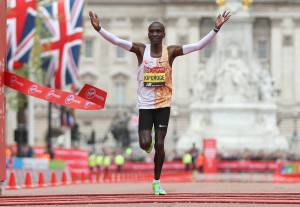 not run in New York, although it’s certainly one of the top marathons in the world, and the winners of the men’s and women’s divisions both receive $100,000 in prize money.
not run in New York, although it’s certainly one of the top marathons in the world, and the winners of the men’s and women’s divisions both receive $100,000 in prize money.
I would submit that Kipchoge is the finest athlete alive today and that he has few peers in history. There is abundant evidence for making such a claim. Born the son of a farmer in the village of Kapsisiywa on November 5, 1984, he stands 5′ 6″, weighs 115 pounds and has virtually no body fat. Kipchoge got started by running to and from school. His first international victory came in the 2003 IAAF World Cross Country Junior Championships in Switzerland. That same year, he set a junior record of 12:52 in the 5,000 meters. He has two Olympic medals in the 5K (bronze at Athens in 2004 and silver at Beijing in 2008) and one in the marathon (gold at Rio de Janeiro in 2016). Such is the quality of Kenyan running that he did not make the team that competed in the 2012 Games in London.
Sang moved him up to the marathon in 2013, and his initial showing at 26.2 miles was most impressive—a victory at Hamburg; his 2:05:30 was a course record. Five months later, he ran at Berlin. Kipchoge’s time was better (2:04:05), and yet he finished second to Wilson Kipsang who set a world record of 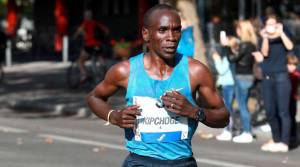 2:03:23. Nobody knew then that Kipchoge would not lose again for six years and counting. He won at Rotterdam (2:05:00) in April 2014, Chicago (2:04:11) in October 2014, London (2:04:42) in April 2015 and Berlin (2:04:00) in September 2015. Kipchoge’s 2:03:05 at London in April 2016, while a course record, was not a world record (remember that Kipsang did a 2:03:23 in 2013) because Dennis Kimetto had set a new mark of 2:02:57 at the 2014 Berlin Marathon.
2:03:23. Nobody knew then that Kipchoge would not lose again for six years and counting. He won at Rotterdam (2:05:00) in April 2014, Chicago (2:04:11) in October 2014, London (2:04:42) in April 2015 and Berlin (2:04:00) in September 2015. Kipchoge’s 2:03:05 at London in April 2016, while a course record, was not a world record (remember that Kipsang did a 2:03:23 in 2013) because Dennis Kimetto had set a new mark of 2:02:57 at the 2014 Berlin Marathon.
I apologize for all those statistics and make the obvious point that the times run by Kipchoge, Kipsang and Kimetto are just breathtaking, spectacularly fast. Hey, back in the 1970s, a sub-2:10 was considered world-class. No longer. The best contemporary male marathoners can go under 2:10 as a training run any day of the week.
Now, I will resume describing Kipchoge’s run to athletic immortality. As mentioned earlier, he won at Rio (a relatively pedestrian 2:08:44) in the summer of 2016. 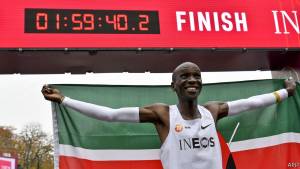 Then came victories at Berlin (2:03:32) in September 2017 and London (2:04:17) in April 2018. Back in Berlin that fall, he roared through the Brandenburg Gate and hit the finish line in a blistering 2:01:39 to set the world record. Whoa! That’s an average of 4:38 per mile. Kipchoge had cut a minute and eighteen seconds off his countryman Kimetto’s four-year-old mark. He returned to London in April 2019 and turned in another staggering performance—2:02:37. With such times, he was quite close to going under 2 hours, something long dreamed of but seen as not realistic.
Then came victories at Berlin (2:03:32) in September 2017 and London (2:04:17) in April 2018. Back in Berlin that fall, he roared through the Brandenburg Gate and hit the finish line in a blistering 2:01:39 to set the world record. Whoa! That’s an average of 4:38 per mile. Kipchoge had cut a minute and eighteen seconds off his countryman Kimetto’s four-year-old mark. He returned to London in April 2019 and turned in another staggering performance—2:02:37. With such times, he was quite close to going under 2 hours, something long dreamed of but seen as not realistic.
That’s why Ineos, a British chemical company, decided to sponsor a special event in Vienna on October 12, 2019. It was all about enabling the splendid Kipchoge to get a sub-2:00 clocking. He had no fewer than 41 pacers (seven at a time) running at a precise speed in a V-formation—in effect, letting Kipchoge “draft” the whole time. There were no other competitors, hydration was delivered by a team member on a bicycle, and other optimization strategies were employed. He did it, crossing the line in 1:59:40. A lot of people were there in the Austrian capital to 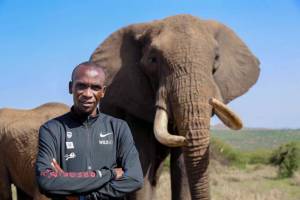 help celebrate his achievement. And while the Guinness Book of World Records calls the feat “the first marathon distance run in under two hours,” it does not constitute an actual record.
help celebrate his achievement. And while the Guinness Book of World Records calls the feat “the first marathon distance run in under two hours,” it does not constitute an actual record.
Note that he has never run in New York or Boston, the USA’s two most prominent marathons. This, I must assume, is because of Sang’s adroit guidance. Kipchoge, not a typical elite marathoner (most such guys peak and decline swiftly), is chasing after world records and recognition as the best marathoner of all time. Why else would he race just twice a year and keep going back to Berlin and London? Those are flat and fast courses, whereas New York and Boston are not. Kamworor’s Big Apple victory a few days ago was under ideal conditions, and he just got a 2:08:13.
Kipchoge, now 35, cannot be expected to remain at this rarified level much longer. There is a good chance that he may never improve on his record, much less get a legitimate sub-2:00. But by scoring 11 victories in 12 of the world’s most fiercely fought marathons, and at such speed, he has built a career of sustained excellence unlike any other. I am by no means the only person to hail Eliud Kipchoge as the greatest athlete of our time and among the greatest ever—in any sport.

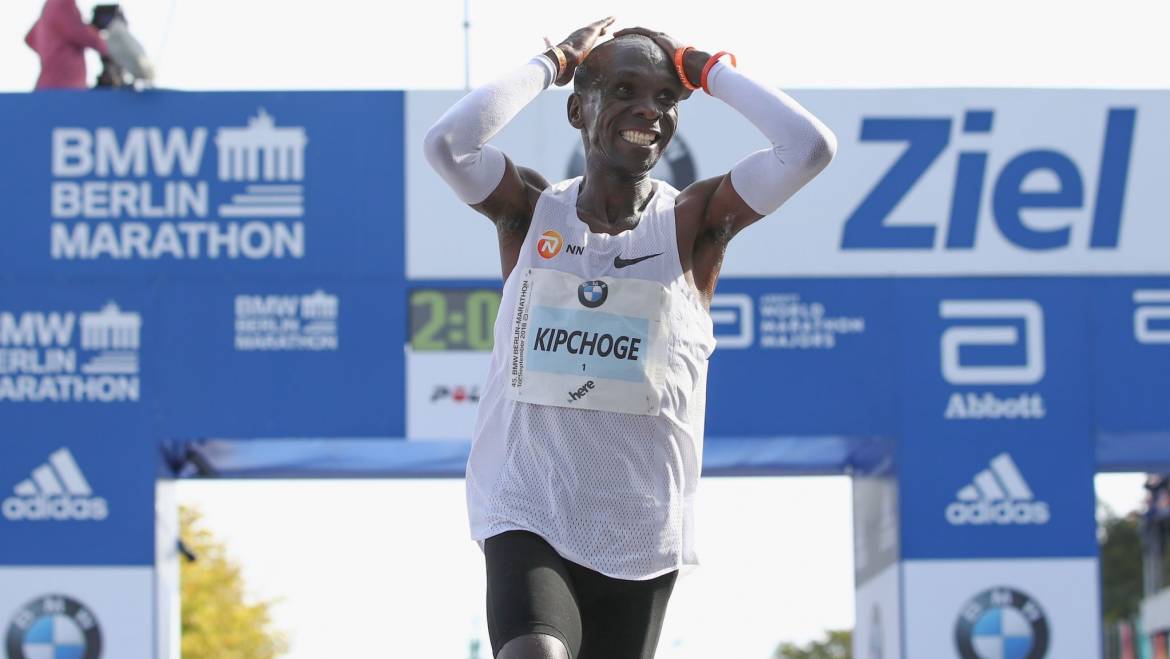
10 Comments
Richard:
In my opinion, the Tarahumara people of Mexico, are the best athletes in the world.
Even with the marathon records kept by Kipchoge, the Tarahumarans run 100 miles routinely, they are more fit and significantly better long distance runners. To the extent they have a monthly lifestyle of running 100 miles per day in search of wild game and going from group to group, I would suggest that their abilities should be considered in a new category of athletic achievements, since their running is not on city streets with rest stops along the way. Their shoes are string sandals, their water and food intake is not provided as in a marathon but rather they have to carry it as they run. They run on dirt/rocky trails up and down mountains, across streams, with some leaping and jumping involved to avoid obstructions. They sometimes run for 24 hours, not just 2 hours. They run fast to wear down the deer they hunt with spears/bow-and-arrows, which they carry with them. These are a rugged, robust, energetic people of survival. Running is their way of life. If they don’t run, they die. They don’t run for the prize money. What do you think?
Gary: I am aware of the Tarahumaras, of course. But they do a different kind of running. The subject here is measured, controlled, timed events on city streets for 26.2 miles. If the Tarahumaras are so great, why don’t they prove it by lining up against Kipchoge and his fellow Kenyans next spring in London or next fall in Berlin? It would be interesting, but I am willing to bet a six-pack of Molsons that Kipchoge would win by a wide margin. The Tarahumaras would be hollering, “Ay de mi! I want to go back to Mexico!”
Soon after writing this article, I was doing some follow-up research. I found that while Kipchoge was running his “sub-2” in Vienna, the Berlin Marathon took place. The winner was a guy I had not previously heard of—Kenenisa Bekele of Ethiopia. He came within two seconds of matching Kipchoge’s world record time of 2:01:39 (set at the same race in 2018).
This guy:
Lung oxygen level: 10%
Took a deep breath
Lung oxygen level: 100%
Hands down, the most inspiring sports moment last year and easily in the Top 10 ever! No human is limited….officially proved by the GOAT Eliud Kipchoge Man from Kenya
He has to be the GOAT, until somebody better comes along.
Just beautiful to read. I am a fan of Kipchoge – love his mental attitude and a very beautiful runner. A legendary performance, the bannister of our century, and it couldn’t have been done by a greater man, well done Eliud!
Yeah! Amazing runner….
My grandmother once in 1999 told me that goes a Kalenjin saying ” a crowned or honored hunter will never again go for hunting rather will utilize his time making arrows and bows for the junior hunters while narrating hunting stories to children’ … Great writing Mr. Pennington!!!!
You forced me to look up Kalenjin. Not all people are familiar with the term. “The Kalenjin are a group of Southern Nilotic peoples indigenous to East Africa, residing mainly in what was formerly the Rift Valley Province in Kenya.” We agree about Kipchoge.
Whenever he laces up his shoes to run a marathon, Eliud kip has and by far remained the focal point of media houses across the world…..
Add Comment